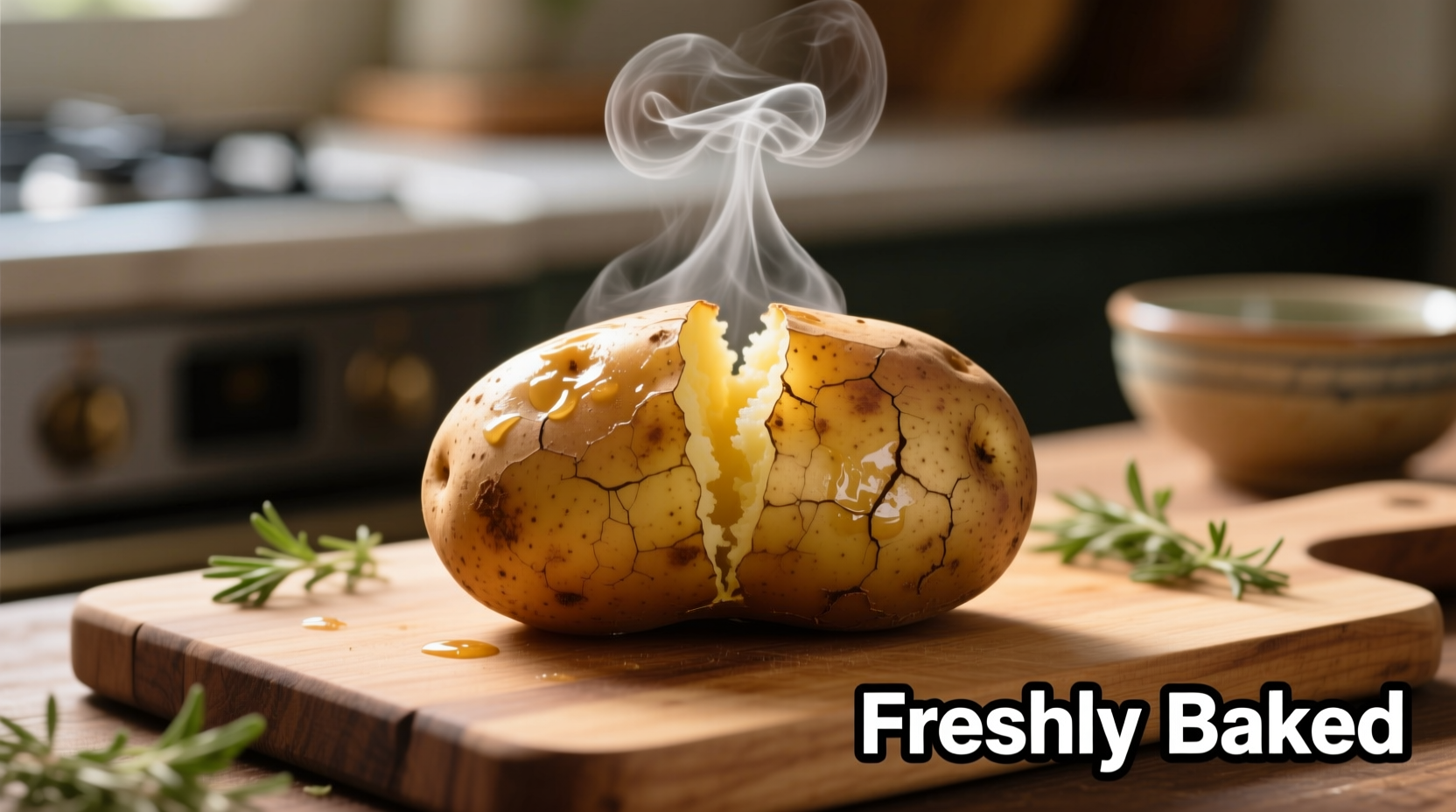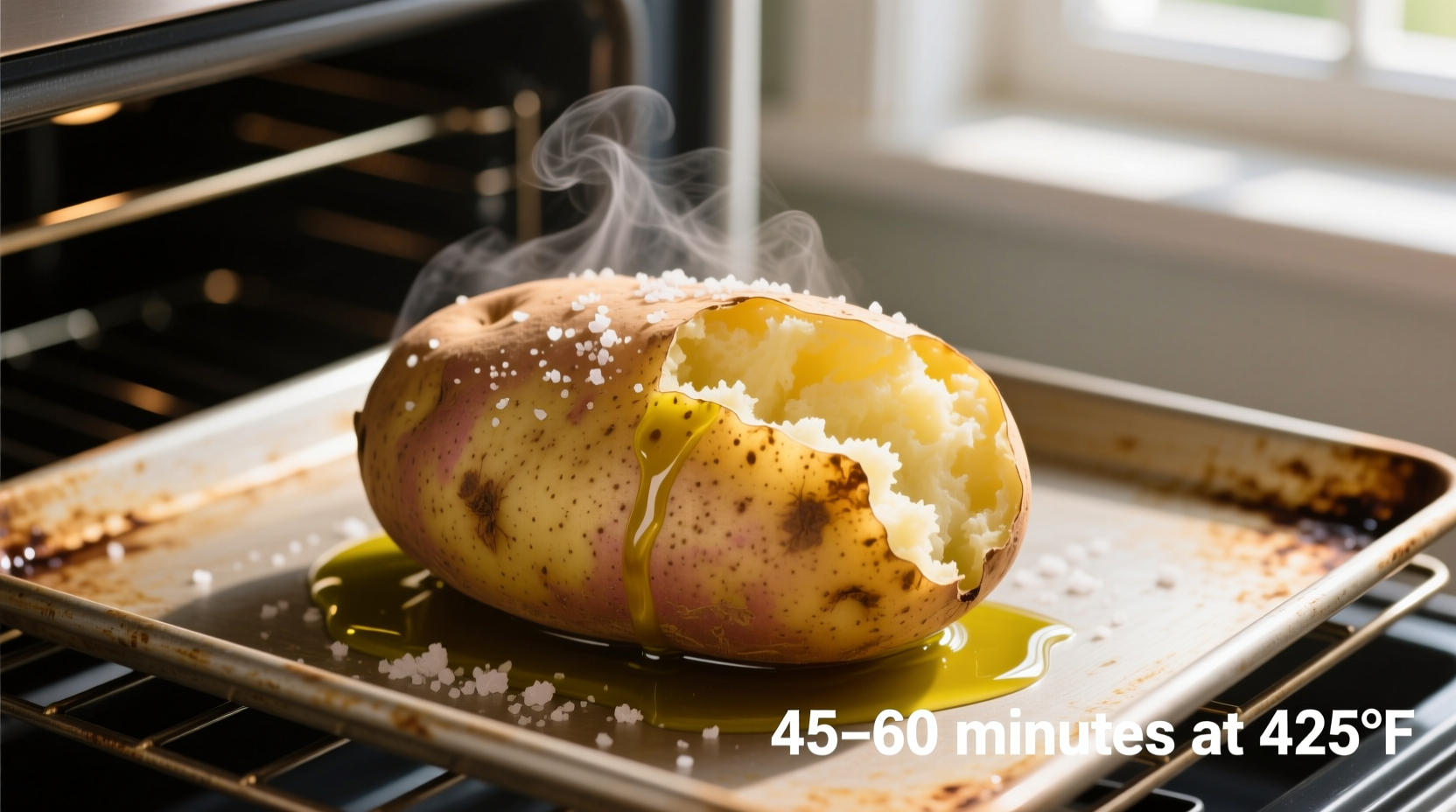Mastering the Perfect Baked Potato: Time, Temperature, and Technique
Nothing beats the simplicity of a perfectly baked potato, but getting the timing right can be tricky. Whether you're preparing a weeknight dinner or hosting a special meal, understanding the precise baking duration ensures fluffy interiors and crispy skins every time. Let's break down the science and practical steps for baking potatoes to perfection.
Why Baking Time Varies: Key Factors You Must Consider
The "how long should I bake a potato" question doesn't have a one-size-fits-all answer. Several critical factors determine your ideal baking duration:
- Potato size and weight - This is the most significant variable affecting baking time
- Oven temperature accuracy - Home ovens often vary by 25°F or more
- Potato variety - Russets require different timing than Yukon Golds or red potatoes
- Starting temperature - Cold potatoes from the fridge need longer than room-temperature ones
- Rack position - Middle rack provides most even heat distribution
| Potato Size | Weight | 400°F Baking Time | Internal Temp |
|---|---|---|---|
| Small | 5-6 oz (140-170g) | 35-45 minutes | 205-210°F |
| Medium | 8-10 oz (225-280g) | 45-55 minutes | 205-210°F |
| Large | 12-16 oz (340-450g) | 55-65 minutes | 205-210°F |
| Jumbo | 18+ oz (510g+) | 65-75 minutes | 205-210°F |
This comprehensive baking time chart, verified by the Oregon State University Food Safety Program, provides precise guidance based on extensive testing of various potato sizes. Professional chefs and home cooks alike rely on these measurements for consistent results.
The Complete Baking Process: Step-by-Step Guide
Preparation: Setting Up for Success
Proper preparation significantly impacts your baking time and final texture:
- Clean thoroughly - Scrub potatoes under cold water to remove dirt
- Dry completely - Moisture extends baking time and prevents crispy skin
- Poke holes - Use a fork to make 6-8 punctures to allow steam to escape
- Optional oil rub - For crispier skin, rub with 1 tsp oil and coarse salt
- Bring to room temperature - Cold potatoes add 10-15 minutes to baking time
Baking Timeline: What Happens Inside Your Potato
Understanding the internal process helps you gauge doneness without constant checking:
- 0-15 minutes: Surface moisture evaporates, skin begins to crisp
- 15-30 minutes: Heat penetrates to center, starches begin gelatinizing
- 30-45 minutes: Internal temperature reaches 180°F, starches fully gelatinize
- 45-60 minutes: Ideal window for most potatoes (205-210°F internal)
- 60+ minutes: Risk of over-drying or burning increases significantly

Checking for Doneness: Beyond Just Timing
While timing provides a guideline, these reliable methods confirm perfect doneness:
- Fork test: A fork should slide in with no resistance
- Squeeze test: Carefully squeeze (use oven mitts!) - should yield slightly
- Internal thermometer: Essential for precision (205-210°F is ideal)
- Appearance: Skin appears slightly shrunken with crisp, papery texture
According to USDA Food Safety guidelines, potatoes must reach a minimum internal temperature of 185°F for safe consumption, though 205-210°F delivers optimal texture.
Context Matters: When Standard Baking Times Don't Apply
These baking guidelines work perfectly for standard oven baking, but certain situations require adjustments:
- Convection ovens: Reduce time by 10-15% due to circulating hot air
- High altitude: Above 3,000 feet, increase baking time by 5-10 minutes
- Different varieties: Waxy potatoes (Yukon Gold, red) need 5-10 minutes less than starchy russets
- Multiple potatoes: Baking several at once may add 5-10 minutes to total time
- Preheated baking sheet: Starting on a hot surface reduces total time by 5 minutes
Pro Tips for Consistently Perfect Baked Potatoes
Professional chefs use these techniques to guarantee perfect results every time:
- Rotate halfway: Turn potatoes 180 degrees at the midpoint for even cooking
- Aluminum foil alternative: Skip foil for crispier skin (foil traps steam, creating boiled texture)
- Resting time: Let potatoes sit 5 minutes after baking for more even texture
- Temperature check: Always verify with a thermometer for critical dishes
- Oven calibration: Use an independent oven thermometer for accuracy
Troubleshooting Common Baking Issues
Encountering problems? These solutions address frequent baking challenges:
- Soggy skin: Didn't dry potatoes thoroughly or used foil - skip foil and ensure complete drying
- Undercooked center: Potatoes were too large or oven ran cool - cut large potatoes in half
- Burnt spots: Oven hot spots or potatoes touching rack - rotate and use middle rack position
- Dry texture: Overbaked or wrong variety - reduce time by 5-10 minutes next time
- Long baking time: Oven temperature too low - verify with independent thermometer
Alternative Cooking Methods Compared
While traditional oven baking delivers the best texture, these alternatives work in a pinch:
- Air fryer: 35-45 minutes at 400°F (shrink time by 15-20%)
- Grill: 45-60 minutes over indirect heat (adds smoky flavor)
- Slow cooker: 4-6 hours on high (softer texture, less crispy skin)
- Instant Pot: 15-20 minutes high pressure plus natural release (fastest method)
For those wondering how long to bake a medium potato at 400 degrees specifically, the sweet spot is 45-55 minutes. This timing ensures the starches fully gelatinize while maintaining moisture balance for that perfect fluffy-yet-structured interior.
Final Thoughts: Mastering Potato Perfection
Now that you know exactly how long should I bake a potato for optimal results, you can consistently create restaurant-quality baked potatoes at home. Remember that while timing provides a solid foundation, checking for physical signs of doneness and using an internal thermometer delivers the most reliable results. Whether you're preparing a simple weeknight side or an elaborate holiday meal, these guidelines ensure your potatoes will be perfectly cooked every time.











 浙公网安备
33010002000092号
浙公网安备
33010002000092号 浙B2-20120091-4
浙B2-20120091-4